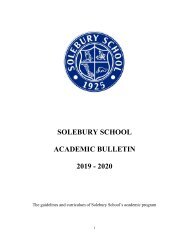Create successful ePaper yourself
Turn your PDF publications into a flip-book with our unique Google optimized e-Paper software.
student elects to take at least 18 credits (3 full years), and many students take more than 24 credits (4 full
years).
YEARLONG COURSES
World History—From Chaos to Order: In World History we will examine major events, individuals,
and innovations that have created and shaped the world we live in today. By applying the frame of
“revolution,” we will work to expose and understand what propels humans to make or accept change(s).
We will also take time to connect historical events to current ones, thus working to appreciate how history
is not simply a foregone conclusion but rather one choice made from a series of options. Admittedly, due
to the nature of the course and the breadth and depth we hope to achieve, we will not be able to cover
everything from the past to the present. Students will, however, work to master the historical skills
necessary to delve into the origins of the structures, values, traditions, and conflicts that have shaped our
world. They will read from primary and secondary sources in order to compare and contrast the
development of various societies, movements, and phenomena. Over the course of the year, students will
work to develop and enhance their reading, writing, analytical, and research skills, and complete several
group and individual projects. Careful preparation of readings and attention to detail in writing is essential
to success. Each student is expected to complete all assigned work on time and contribute consistently
and with enthusiasm to class discussions and group activities. Recommended for 9th grade. Global, 6
credits
Textbook: A History of World Societies, 11th Ed. (Concise Edition) by Wiesner-Hanks, Ebrey, Beck,
Davila, Crowston & McKay. ISBN: 978-1-319-07011-3
Honors World History: How We Got to Now: From the deep past to today, people have been forced to
solve certain social problems, such as: food production and storage; protection against aggressors; provision
of shelter from the elements; and the creation and maintenance of social, ideological, and spiritual orders. In
meeting these challenges, people’s responses depended, to varying degrees, on their environments and
cultures (and sometimes luck!). They developed different civilizations over time, and, as those civilizations
became more sophisticated, they began to interact more with other civilizations – through trade, war,
conquest, technological and cultural borrowing, etc. In World History, we begin with the principal cultural
hearths, as it were, and trace world history through time, from the cradles of civilization to the forces,
conflicts, and co-operations that have led to the emergence of global interdependence in the modern era. In
this course, students will learn to think openly and critically about what they read, to identify and express
empathy with different historical perspectives, to mount a historical argument, and to develop a deeper
understanding of themselves and their place in the world. Recommended for 9th grade. Global 6 credits
Textbook: A History of World Societies, 11th Ed. (Concise Edition) by Wiesner-Hanks, Ebrey, Beck,
Davila, Crowston & McKay. ISBN: 978-1-319-07011-3
Ethics 10 and Honors Ethics 10: We are all endowed with the power to lead ourselves, to support our
families, and to engage meaningfully in our social and political worlds. This fact is particularly relevant to
sophomores, who stand on the threshold of forging a path in the upper school and beyond. In order for
students to make positive contributions to all of their present and future communities, it is essential that they
appreciate the ethical weight of their lives. Our intention is not to provide answers; rather, we encourage
students to engage in deliberate inquiry and reflection—often the precursor to healthy decision making—that
we hope becomes a lifelong habit. In creating this seminar style class, instructors draw content from world
history, philosophy, and the social sciences; we introduce students to deep study in these fields and we hope
to inspire further study in all of them. We believe that students benefit enormously from study in Ethics, so
we designed this full year course to be taken by all sophomores; as such, it reinforces the habits of thought
introduced in the 9th grade World History course and prepares students for the advanced work that they will
undertake in their junior and senior years. Recommended for tenth grade. Global 6 credits
No Textbook Required
26




